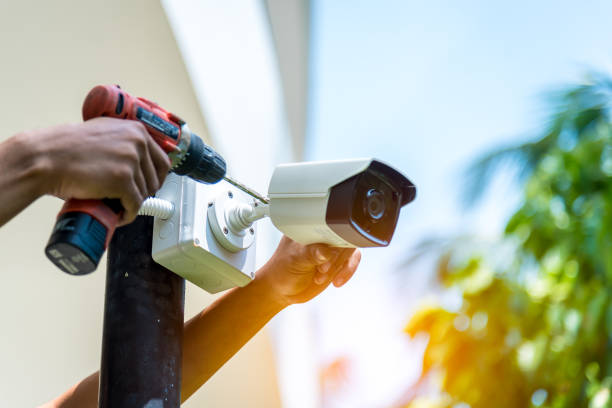Wired security cameras are usually hardwired to a central hub, which can be a digital video recorder or an internet-connected router. Then the footage can be either stored locally or transmitted to a cloud-based server.
Generally, wired camera systems are more reliable than wireless models and they are great for homeowners who don’t plan on moving the cameras around too much. But they require you to hide exposed wires, and that can be tricky.
Also Read: lpb piso wifi 10.0.0.1 pause time login
Reliability
Wired security cameras transmit their audio and video footage to a central hub where the operators can see it or choose to store it in a digital file. This type of system is popular because it doesn’t depend on a wireless connection to send information and is also less susceptible to hacking.
While the wires connecting the camera to the hub are hard to reach for potential burglars, the cameras themselves can still be targeted. Burglars may try to tamper with the exposed cables, causing the cameras to fail. Additionally, if the cameras are located outdoors, they may be vulnerable to extreme weather conditions.
The wires connected to a wired security camera are typically bundled into a single cord that both transmits data and supplies power to the device. These are called POE (Power Over Ethernet) cameras. This makes them easier to use and install compared to a traditional security camera that requires two separate cords to supply data and power.
One drawback of the wired security camera is that it usually needs a professional to set it up because it involves running long lengths of cable throughout the building. The cables also need to be hidden so that they aren’t visible to intruders. The wires are also more likely to become damaged or disconnected if the camera is moved from one place to another.
Because wired security cameras depend on a cable to operate, they’re more stable than their wireless counterparts. They aren’t as prone to losing or disrupting their network connection like WiFi devices, which can be affected by environmental factors such as dust or electromagnetic interference.
However, a wired security camera’s stability can be an issue for organizations that need flexibility in how they deploy their devices. It’s hard to move a wired security camera after it is installed, which can be a problem for companies that need to monitor multiple buildings or locations that are undergoing renovations. The cameras can also be harder to relocate if the location is near other electrical equipment that might interfere with its signal.
High Resolution
The higher the resolution of a camera, the more detailed and clear the image will be. Wired security cameras typically have a 720p or 1080p resolution, though some brands are starting to offer more high-resolution options like 2K and 4K.
In addition to a higher resolution, wired cameras generally have a larger field of view, meaning they can see more of your property at once. This is important for home security because it can help you identify any potential intruders or suspicious activity.
Another benefit of wired security cameras is their reliability. Because they’re hardwired into your home’s power source, a cut in your cable can’t disrupt your video feed. This is a big advantage over wireless cameras, which depend on over-the-air signals that can be easily interrupted by interference or weak connections.
If you want to monitor your property from a remote location, a wired camera is also a good option. The signal can be transmitted through a secure encrypted network that prevents unauthorized access to your footage. A wired security camera system is also more difficult to hack than a wireless camera.
While you can install a wired security camera yourself, it’s best to hire a professional to ensure that your system is installed correctly and doesn’t cause damage to your home or property. A professional can also advise you on the best location for your cameras, and they’ll know how to properly run the cables through your walls or ceiling.
Lastly, a professional will help you choose the right hardware for your needs. For example, if you’re using a wired security camera for outdoor surveillance, you’ll need to buy a weatherproof camera that can withstand harsh weather conditions. A pro can also advise you on the number of cameras you need and the best place to position them on your property.
When choosing a wired security camera, you should consider how much storage space you need and whether or not the cameras support cloud storage. Some wired security cameras come with built-in storage while others have an external hard drive that can be plugged into your home’s router. Regardless of how the camera saves its information, it’s crucial to have a strong internet connection for streaming and storage.
Portability
When you choose a wired security camera that is PoE enabled, you can plug one Ethernet cable into your device on one end and your internet router on the other and get both power and internet connectivity from this single cord. This is a lot easier to do than plugging in two separate cords for the same function.
Wired cameras also tend to work a bit better when it comes to delivering a consistent video signal compared to wireless options. This is because there’s a physical connection to the central hub that the camera connects to which prevents any interruptions in the feed. Additionally, a wired security camera can typically record 24/7 as long as it is plugged into a power source. This is a big plus for homes that need constant surveillance or businesses that need to monitor their premises on a regular basis.
However, the biggest drawback to choosing a wired security camera is that it’s not portable. This means that you can’t just remove a wired security camera and bring it to another location, which is a major problem if you live in an area that experiences frequent rolling blackouts. Furthermore, if you want to mount your wired security camera outside, you’ll need to drill holes in the wall for the cables to run through, and this is a no-go for renters or homeowners who don’t own their property.
Lastly, wired security cameras can be more difficult to steal because they’re physically connected to the camera’s central hub. This can also make them more durable, especially if you choose to mount your camera outdoors where it’s more likely to be damaged or vandalized by people or animals. Additionally, a wired security camera with a backup battery can keep its recording functional even during power outages. In addition, a battery-powered model can also be used as a standalone system in areas that are prone to prolonged or frequent outages without the need for an internet connection. In this scenario, the data can still be stored locally on an SD card.
Flexibility
Wired security cameras are hardwired to a central hub that sends the footage to your home or business, where it can be viewed in real-time or stored. The wires also provide more reliability and resistance to interference than wireless signal transmission. Wired systems are ideal for businesses or homes that want comprehensive coverage of their property.
Widened video resolution is another benefit of a wired system. High-resolution cameras, especially those with a high number of pixels, offer a crystal-clear image that can capture even the smallest details. The majority of wired security cameras have a 720p or higher resolution, but some are starting to roll out 2K and 4K options as well.
One downside of a wired security camera is that it can be more expensive than its wireless counterpart. However, the cost can be offset by reduced installation costs and fewer monthly fees. Many wired systems use Power over Ethernet (PoE) technology, which eliminates the need for a separate recorder or DVR. This can cut the total system cost by up to 30 percent.
Some wired security cameras are capable of recording continuously, though they must be plugged into power in order to function. Other models are able to record when they detect motion or sound, and still others have two-way audio capabilities and machine learning functionality.
The biggest drawback of a wired security camera is its reliance on a hardwired connection. This means that if the cable is severed, so is your video feed. A wire-free option, like a battery-powered camera that uploads footage to the cloud or a local storage drive, would provide greater flexibility.
If you’re interested in a wired security camera, it may be best to hire an experienced technician to install it. This will ensure that the wires are properly run and that the camera is in the right place. For a pre-existing space, this could mean using loud power tools and poking holes into walls and ceilings. This could be a problem for some homeowners or renters who prefer not to alter their living space.




















